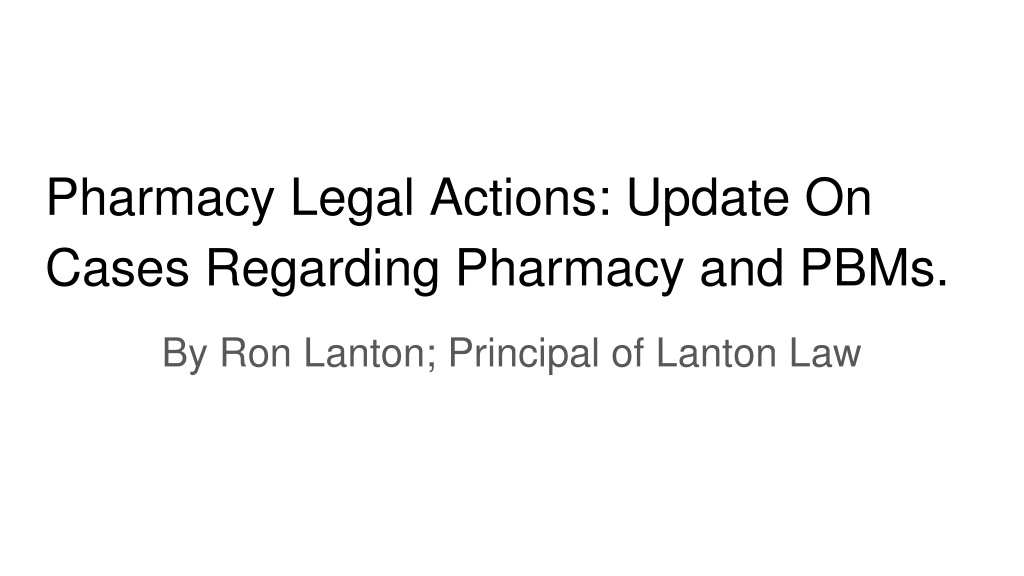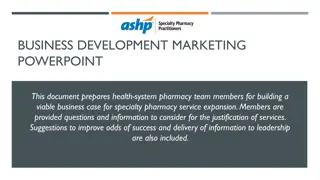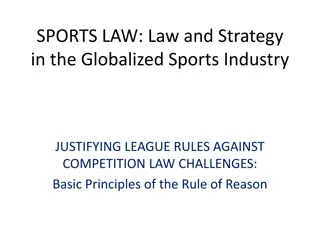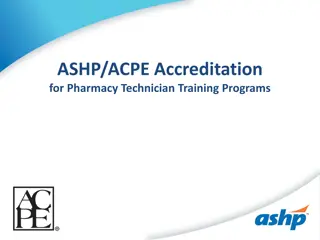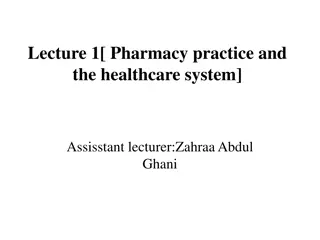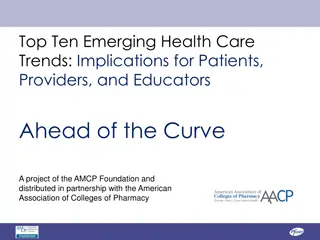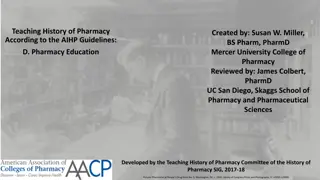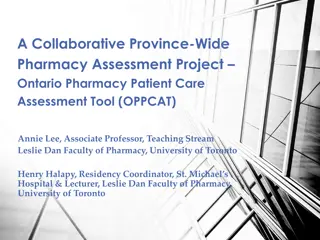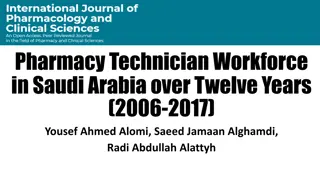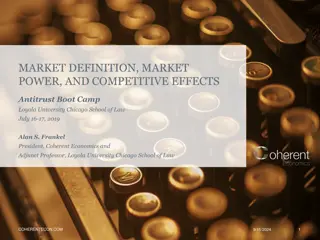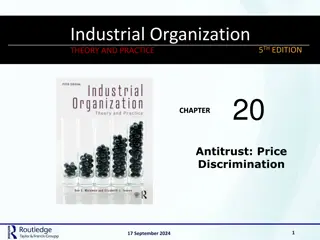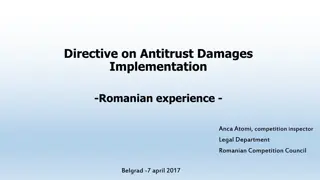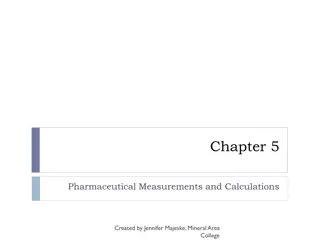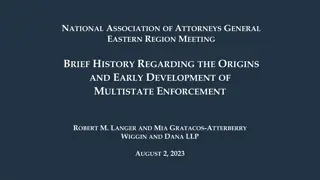Update on Pharmacy Legal Actions & Antitrust Cases
Explore the latest insights on pending class action lawsuits and antitrust claims impacting independent pharmacies, including discussions on current cases, the role of FTC, and the Rutledge v. PCMA lawsuit. Learn about class actions, certification processes, and important legal considerations in the pharmacy sector. Expert analysis by Ron Lanton of Lanton Law. Disclaimer: Information presented is for informational purposes only and does not constitute legal advice.
Download Presentation

Please find below an Image/Link to download the presentation.
The content on the website is provided AS IS for your information and personal use only. It may not be sold, licensed, or shared on other websites without obtaining consent from the author. Download presentation by click this link. If you encounter any issues during the download, it is possible that the publisher has removed the file from their server.
E N D
Presentation Transcript
Pharmacy Legal Actions: Update On Cases Regarding Pharmacy and PBMs. By Ron Lanton; Principal of Lanton Law
About Lanton Law fgfAb Ron Lanton III, Esq, Principal Lanton Law Chair of the Biologics Committee for the NY Bar Association and is currently admitted to practice law in IL, NY and D.C. Author in several trade publications Over 25 years of combined government affairs and legal experience Lanton Law is a national boutique law and lobbying firm that provides regulatory and government affairs services to healthcare/life science and technology stakeholders.
Disclosure The materials and information provided in this presentation are for informational purposes only and not for the purpose of providing legal advice. Use of and access to this presentation or any of the materials or information contained within this presentation do not create an attorney client relationship between Lanton Law and the user or viewer. You should contact your attorney to obtain advice with respect to any particular issue or problem.
Objectives This update will focus on pending class action lawsuits and antitrust claims that could affect independent pharmacy. We will discuss the following; 1. Current class action cases and how they work. The focus will be on the current P.U.N.C.H. lawsuit against PBMs 2. Antitrust issues and how it may affect pharmacy. This includes an explanation as to what the FTC does and does not do. 3. Review of the Rutledge v. PCMA lawsuit and discussion of ERISA.
Class Actions What is a Class Action? - When a large number of people (hundreds) are negatively affected by the same harmful or unlawful event. - Certain procedural requirements are met - A Class is formed once these two above are met and this Class can now sue in one case. - Most important first step is to certify the Class
Certification of a Class Under the Federal Rules of Civil Procedure a class is certified when it meets the following; - There are so many people with claims that it is impracticable to simply join them in one lawsuit. Joining a lawsuit requires each new party to join a case with their own claims and get permission to join by the Court separately. - There must be common questions of law and fact - All the Plaintiffs have the same claims and defenses - The lawyers for the class will provide fair and adequate protection for the class.
Class Actions Difference between a class action notice and a certification. Many times a certification can be mistaken for a class action notice. Lawyers have to first find that the plaintiffs meet the certification requirements once this is done they file a case. Once the case is filed a Class Action Notice will go out to all possible plaintiffs giving them information on the case and allowing them to opt out . Certification is just the Courts process of identifying that everyone in the class meets certain conditions.
P.U.N.C.H Class Action Lawsuit - Who is P.U.N.C.H? - What is the issue that they are suing on? - What has happened so far? It is important to know that a class action is a costly endeavor and should always be organized by an established law firm with experience in class action lawsuits. These lawsuits are not something that can be started easily and many of them end up settling out of court.
Antitrust Antitrust laws are a collection of three laws that have been revised over the years and are the core of federal antitrust law. - Sherman Act 1890 set up the concept of antitrust as the preservation of free and unfettered competition as the rule of trade Federal Trade Commission Act of 1914 created the FTC The Clayton Act of 1914 - -
Antitrust What are the issues? - PBM pricing (MAC) - PBM mail order - Preferred pharmacy networks All of these are issues from the pharmacy perspective involve antitrust. This is not the case in law. In law, these practices by the PBMs are actually seen as encouraging competition and a strong counteract to retail pharmacy monopoly. - How did this happen? There was a shift in the 1970 s towards a policy of getting the greatest amount of goods to the customer, reliably and at the lowest cost. This policy change made businesses that could have been considered antitrust before (such as PBMs) to now be legal.
Antitrust Federal Trade Commission There are two bureaus in the FTC that deal with the enforcement of antitrust on behalf of consumers. - Bureau of Competition - Bureau of Economics Vertical Relationships- The main area where the FTC can affect pharmacy is through the supply chain s vertical relationships. A vertical arrangement may violate the antitrust laws, however, if it reduces competition among firms at the same level (say among retailers or among wholesalers) or prevents new firms from entering the market.
Antitrust Why is antitrust fo hard to prove? The FTC has a view that vertical relationships are beneficial to the economy and a violation of antitrust in the supply chain would involve an instance where there is only one player in the supply chain. The FTC also deals with mergers which can have a indirect effect on pharmacy through such deals as CVS and Caremark.
Review of Rutledge v. PCMA Arkansas enacted a law in 2015 that required that reimbursement rates be raised if the rate fell below wholesale acquisition cost. PCMA sued on the basis that Arkansas did not have the ability to regulate the PBM as ERISA and Medicare Part D, federal laws, superseded Arkansas law. The federal district court struck down half of the law in regard to ERISA plans only. PCMA appealed this federal district court ruling in the 8th Circuit Appeals Court as to Medicare Part D. Arkansas then countered with an appeal of the ERISA preemption ruling. The 8th circuit then ruled in favor of PCMA and struck down the entire Arkansas law. Arkansas then appealed the law to the Supreme Court who decided to take up the case in October of this year.
ERISA The Employee Retirement and Income Security Act of 1974 (ERISA) It is designed to protect the interests of the private-sector employees who are benefit plan participants and their beneficiaries. It requires plan sponsors to give out plan information, sets standards, establishes enforcement provisions to ensure plan funds are protected and makes sure that benefits are given out even if the employer goes bankrupt. ERISA is a federal law and it has a preemption provision. Congress did however expressly save state insurance law from ERISA preemption. Congress then created confusion when it deemed self-funded plans not to be insurance. This means that ERISA does not allow states to protect any patients that are covered under a self-funded plan. This leaves self-funded plans to be the exclusive area of the federal government.
What happens if.? Miller Supreme Court Case Status Quo if PCMA wins- Nothing will change as many states have now created laws that address only state insurance since the federal district court ruling. What happens if the State wins?- This could mean many more states will reenact laws or create new ones to regulate reimbursement.
Non-Interference Clause The law authorizing Medicare Part D, contains a provision that bars the secretary of Health and Human Services from interfering in negotiations among insurers, drug manufacturers, and pharmacies. Lawmakers included the provision to ensure adequate competition and innovation in the drug marketplace. (i) Noninterference. In order to promote competition under this part and in carrying out this part, the Secretary (1) may not interfere with the negotiations between drug manufacturers and pharmacies and PDP sponsors; and (2) may not require a particular formulary or institute a price structure for the reimbursement of covered part D drugs.
Non-Interference Clause Proposals to repeal or modify the noninterference provision to give the Secretary the authority to negotiate drug prices have been introduced since the start of the Part D program. Supporters of Secretarial negotiation maintain that by leveraging the combined purchasing power of tens of millions of Part D enrollees, the Secretary could secure larger discounts and rebates than can be obtained by plan sponsors. Opponents note that Part D enrollment is concentrated in a few plans two sponsors alone have 40% of enrollees that already have substantial bargaining power, and that changing the noninterference provision could limit formulary coverage. Statements made by Supporters and Opponents (NCPA, AHIP, PhRMA)
Non-Interference Clause So what can be done about the non-interference clause according to Congressional Research Service? Formularies Scope of Negotiation Fallback Pricing/Penalties Compulsory Licensing Binding Arbitration S.99 - Medicare Drug Price Negotiation Act currently in the Senate Finance Committee
Non-Interference Clause What to do against the non-interference clause We don t want to give legal advice because each organization is different, though we can suggest you have your counsel look at the following. Possible cause of action against CMS: Violation of the Administrative Procedure Act ( APA )? Agency action may not be arbitrary, capricious, constitute an abuse of discretion, or otherwise not violate the law.
Contact Information Ron Lanton III, Esq. Principal Lanton Law @Lantonlaw1 240-482-6060 https://www.lantonlaw.com rlanton@lantonlaw.com
